 Libri di Buchanan James M. su Unilibro.it) Libri di Buchanan James M. su Unilibro.it)
|
|
2025 |
 Title :
Perché dobbiamo lavorare di più e risparmiare di più. Il valore economico dell'etica del lavoro
Title :
Perché dobbiamo lavorare di più e risparmiare di più. Il valore economico dell'etica del lavoroAuthor: Buchanan James M. Publisher: Liberilibri In questa raccolta di saggi, il grande economista James M. Buchanan spiega con penna analitica, ma anche ironica e divulgativa, la centralità dell'etica del lavoro in una società che voglia diventare più ricca. Per farlo parte da un'esperienza personale: appassionato di football americano, Buchanan si è posto il problema di come potesse passare un intero fine settimana a guardare le partite senza sentirsi in colpa. La soluzione si è rivelata semplice: procuratosi un piccolo martello, ha iniziato a sgusciare delle noci da conservare, attività utile che ha placato il senso di colpa per il lungo tempo trascorso davanti alla tv. Buchanan decide così di studiare il fenomeno per stabilire se coloro che fanno parte di un'economia siano più ricchi quando condividono un impegno etico a lavorare sodo, e a risparmiare di più, di quando non lo fanno. Il titolo del saggio suggerisce che la sua risposta è affermativa. La scelta del singolo di lavorare e risparmiare di più giova effettivamente anche al contesto sociale, e un lungo processo di evoluzione culturale sembra averci inculcato una norma etica che in effetti ci avvantaggia, o che almeno dovrebbe, qualora fosse rispettata da tutti. € 16,00
Scontato: € 15,20
|
|
|
2007 |
 Title :
Economics from the Outside in
Title :
Economics from the Outside inAuthor: Buchanan James M. Publisher: Texas A & M Univ Pr Nobel laureate in economics James Buchanan has been called—and indeed, calls himself—an outsider in American economics. Original and even unorthodox in his pioneering contributions to public choice theory and variously revered or berated for his influence on the economic policies that took hold in the Reagan years, he has stimulated a productive vein of economic inquiry and an important strain of public policy. First published in 1992 under the title Better Than Plowing And Other Personal Essays, this collection of autobiographic writings was hailed as engaging, honest, and fascinating. The four new chapters of the present volume fill some gaps in his earlier reflections and add valuable assessments of the roots of his academic work. Economics from the Outside In provides a fascinating look at the humble origins and academic development of a recipient of the Nobel Prize, the intellectual underpinnings of a key American economic policy, and the role of the academician in today's society. € 15,80
|
|
|
2006 |
 Title :
Stato, mercato e libertà
Title :
Stato, mercato e libertàAuthor: Buchanan James M.; Da Empoli D. (cur.) Publisher: Il Mulino James M. Buchanan, Nobel per l'economia nel 1986, è professore alla George Mason University in Virginia e Direttore del Center for Study of Public Choice. Il suo contributo ha spaziato dalla finanza pubblica di tipo europeo-continentale ai motivi fondamentali del 'calculus of consent', al costituzionalismo economico. Riscoperto e valorizzato negli ultimi anni, non solo dagli economisti, ha continuato a svolgere un'intensa attività scientifica, ampliando le logiche della sua impostazione di 'constitutional political economy' con percorsi molto innovativi nell'etica, nel campo delle scelte pubbliche e degli 'anticommons'. € 27,00
|
|
|
2004 |
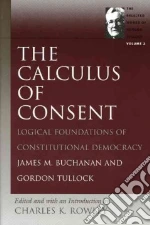 Title :
The Calculus of Consent
Title :
The Calculus of ConsentAuthor: Tullock Gordon, Buchanan James M., Rowley Charles Kershaw Publisher: Liberty Fund The Calculus of Consent, the second volume of Liberty Fund’s The Selected Works of Gordon Tullock, is a reprint edition of the ground-breaking economic classic written by two of the world’s preeminent economists--Gordon Tullock and Nobel Laureate James M. Buchanan. This book is a unique blend of economics and political science that helped create significant new subfields in each discipline respectively, namely, the public choice school and constitutional political economy. Charles K. Rowley, Duncan Black Professor of Economics at George Mason University, points out in his introduction, ?The Calculus of Consent is, by a wide margin, the most widely cited publication of each coauthor and, by general agreement, their most important scientific contribution.” The Calculus of Consent is divided into four parts, each consisting of several chapters. The introduction by Professor Rowley provides a short overview of the book and identifies key insights that permeated the bounds of economics and political science and created an enduring nexus between the two sciences. Part I of The Calculus of Consent establishes the conceptual framework of the book’s subject; part II defines the realm of social choice; part III applies the logic developed in part II to describe a range of decision-making rules, most notably, the rule of simple majority; while part IV explores the economics and ethics of democracy. Charles K. Rowley is Duncan Black Professor of Economics at George Mason University and a Senior Fellow of the James M. Buchanan Center for Political Economy at George Mason University. He is also General Director of the Locke Institute. The entire series includes: Volume 1: Virginia Political Economy € 14,50
|
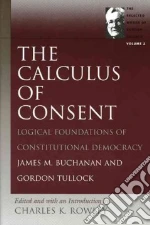 Title :
The Calculus of Consent
Title :
The Calculus of ConsentAuthor: Tullock Gordon, Buchanan James M., Rowley Charles Kershaw (EDT) Publisher: Liberty Fund The Calculus of Consent, the second volume of Liberty Fund’s The Selected Works of Gordon Tullock, is a reprint edition of the ground-breaking economic classic written by two of the world’s preeminent economists--Gordon Tullock and Nobel Laureate James M. Buchanan. This book is a unique blend of economics and political science that helped create significant new subfields in each discipline respectively, namely, the public choice school and constitutional political economy. Charles K. Rowley, Duncan Black Professor of Economics at George Mason University, points out in his introduction, ?The Calculus of Consent is, by a wide margin, the most widely cited publication of each coauthor and, by general agreement, their most important scientific contribution.” The Calculus of Consent is divided into four parts, each consisting of several chapters. The introduction by Professor Rowley provides a short overview of the book and identifies key insights that permeated the bounds of economics and political science and created an enduring nexus between the two sciences. Part I of The Calculus of Consent establishes the conceptual framework of the book’s subject; part II defines the realm of social choice; part III applies the logic developed in part II to describe a range of decision-making rules, most notably, the rule of simple majority; while part IV explores the economics and ethics of democracy. Charles K. Rowley is Duncan Black Professor of Economics at George Mason University and a Senior Fellow of the James M. Buchanan Center for Political Economy at George Mason University. He is also General Director of the Locke Institute. The entire series includes: Volume 1: Virginia Political Economy € 23,20
|
|
2000 |
 Title :
Politics As Public Choice
Title :
Politics As Public ChoiceAuthor: Buchanan James M. Publisher: Liberty Fund This volume presents a collection of thirty-four essays and shorter works by James M. Buchanan that represent the brilliance of his founding work on public-choice theory. The work of James M. Buchanan is perhaps most often associated with his helping to found public-choice theory. Buchanan’s book-length works such as The Calculus of Consent or The Reason of Rules (Volumes 3 and 10, respectively, in Liberty Fund’s The Collected Works of James M. Buchanan) are best known for their brilliant application of market behavioral models to government. But Buchanan’s shorter works represented here all show originality and insight as well as clear articulation of important theoretical principles. What’s more, these essays have all had a significant impact on the subsequent literature about public choice. In this volume, the works are broken down into these major categorical groupings: 1.General Approach 2.Public Choice and Its Critics 3.Voters 4.Voting Models 5.Rent Seeking 6.Regulation 7.Public Choice and Public Expenditures As Robert D. Tollison concludes his foreword to this volumes, ?Read in conjunction with the other parts of the ?Collected Works,’ these papers offer the reader a fuller appreciation of the public-choice revolution and its impact and prospects.” James M. Buchanan is an eminent economist who won the Alfred Nobel Memorial Prize in Economic Sciences in 1986 and is considered one of the greatest scholars of liberty in the twentieth century. The entire series will include: Volume 1: The Logical Foundations of Constitutional Liberty € 11,90
|
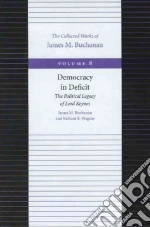 Title :
Democracy in Deficit
Title :
Democracy in DeficitAuthor: Buchanan James M., Wagner Richard E. Publisher: Liberty Fund Democracy in Deficit is one of the early comprehensive attempts to apply the basic principles of public-choice analysis to macroeconomic theory and policy. According to Robert D. Tollison in the foreword, ?The central purpose of the book was to examine the simple precepts of Keynesian economics through the lens of public-choice theory. The basic discovery was that Keynesian economics had a bias toward deficits in terms of political self-interest.” Democracy in Deficit opened the door for much of the current work on political business cycles and the incorporation of public-choice considerations into macroeconomic theory. Even in the area of monetarism, Buchanan’s landmark work has greatly influenced the sway of contemporary theorists away from the nearly universally held belief of Keynesian theory. Democracy in Deficit contributes greatly to Buchanan’s lifelong fiscal and monetary rules to guide long-term policy in macroeconomics. The book serves to bolster Buchanan’s central beliefs in the necessity of a balanced-budget amendment to the U.S. Constitution and in monetary rules rather than central bank discretion. The book is co-authored with Richard Wagner, a respected colleague of Buchanan, whom Buchanan recognized as helping to keep the book free of polemics and on target with its central purpose of applying the elementary theory of public choice. James M. Buchanan is an eminent economist who won the Alfred Nobel Memorial Prize in Economic Sciences in 1986 and is considered one of the greatest scholars of liberty in the twentieth century. The entire series will include: Volume 1: The Logical Foundations of Constitutional Liberty € 23,50
|
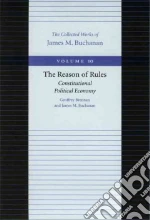 Title :
The Reason of Rules
Title :
The Reason of RulesAuthor: Brennan Geoffrey, Buchanan James M. Publisher: Liberty Fund In his foreword, Robert D. Tollison identifies the main objective of Geoffrey Brennan and James M. Buchanan’s The Reason of Rules: ?. . . a book-length attempt to focus the energies of economists and other social analysts on the nature and function of the rules under which ordinary political life and market life function.” In persuasive style, Brennan and Buchanan argue that too often economists become mired in explaining the obvious or constructing elaborate mathematical models to shed light on trivial phenomena. Their solution: economics as a discipline would be better focused on deriving normative procedures for establishing rules so that ordinary economic life can proceed unaffected as much as possible by social issues. In The Reason of Rules, Brennan and Buchanan sketch out a methodological and analytical framework for the establishment of rules. They point out that the consideration of rules has its roots in classical economics and has been hinted at in the work of some contemporary economists. But the enterprise of applying the analytical rigor of modern economics to the establishment of effective rules is the little-traveled road that bears the most promise. In fact, the basic idea of the importance of rules is a thread that runs through virtually the whole of Buchanan’s distinguished career, and it is one of his signal contributions to the contemporary discipline of economics. The Reason of Rules is an elaboration of the potential for rules and the normative process by which they can best be devised. James M. Buchanan is an eminent economist who won the Alfred Nobel Memorial Prize in Economic Sciences in 1986 and is considered one of the greatest scholars of liberty in the twentieth century. The entire series will include: Volume 1: The Logical Foundations of Constitutional Liberty € 22,20
|
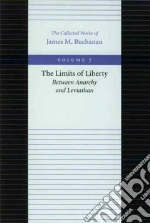 Title :
The Limits of Liberty
Title :
The Limits of LibertyAuthor: Buchanan James M. Publisher: Liberty Fund Published originally in 1975, The Limits of Liberty made James Buchanan’s name more widely known than ever before among political philosophers and theorists and established Buchanan, along with John Rawls and Robert Nozick, as one of the three new contractarians, standing on the shoulders of Hobbes, Locke, and Kant. While The Limits of Liberty is strongly related to Buchanan’s Calculus of Consent (Vol. 3 in Liberty Fund’s Collected Works of James M. Buchanan), it is logically prior to the Calculus, according to Hartmut Kliemt in the foreword, even though it was published later. As Kliemt states, ?[The Limits of Liberty] characterizes the status quo from the point where Paretian politics starts and at the same time describes conceivable processes of interindividual agreement that might lead from a natural equilibrium to a political one.” Buchanan frames the central idea most cogently in the opening of his preface: ?Precepts for living together are not going to be handed down from on high. Men must use their own intelligence in imposing order on chaos, intelligence not in scientific problem-solving but in the more difficult sense of finding and maintaining agreement among themselves. Anarchy is ideal for ideal men; passionate men must be reasonable. Like so many men have done before me, I examine the bases for a society of men and women who want to be free but who recognize the inherent limits that social interdependence places on them.” James M. Buchanan is an eminent economist who won the Alfred Nobel Memorial Prize in Economic Sciences in 1986 and one of the greatest scholars of liberty in the twentieth century. The entire series will include: Volume 1: The Logical Foundations of Constitutional Liberty € 23,50
|
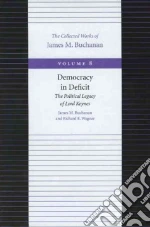 Title :
Democracy in Deficit
Title :
Democracy in DeficitAuthor: Buchanan James M., Wagner Richard E. Publisher: Liberty Fund Democracy in Deficit is one of the early comprehensive attempts to apply the basic principles of public-choice analysis to macroeconomic theory and policy. According to Robert D. Tollison in the foreword, ?The central purpose of the book was to examine the simple precepts of Keynesian economics through the lens of public-choice theory. The basic discovery was that Keynesian economics had a bias toward deficits in terms of political self-interest.” Democracy in Deficit opened the door for much of the current work on political business cycles and the incorporation of public-choice considerations into macroeconomic theory. Even in the area of monetarism, Buchanan’s landmark work has greatly influenced the sway of contemporary theorists away from the nearly universally held belief of Keynesian theory. Democracy in Deficit contributes greatly to Buchanan’s lifelong fiscal and monetary rules to guide long-term policy in macroeconomics. The book serves to bolster Buchanan’s central beliefs in the necessity of a balanced-budget amendment to the U.S. Constitution and in monetary rules rather than central bank discretion. The book is co-authored with Richard Wagner, a respected colleague of Buchanan, whom Buchanan recognized as helping to keep the book free of polemics and on target with its central purpose of applying the elementary theory of public choice. James M. Buchanan is an eminent economist who won the Alfred Nobel Memorial Prize in Economic Sciences in 1986 and is considered one of the greatest scholars of liberty in the twentieth century. The entire series will include: Volume 1: The Logical Foundations of Constitutional Liberty € 13,00
|
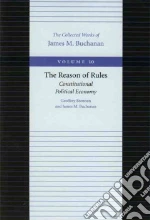 Title :
The Reason of Rules
Title :
The Reason of RulesAuthor: Brennan Geoffrey, Buchanan James M. Publisher: Liberty Fund In his foreword, Robert D. Tollison identifies the main objective of Geoffrey Brennan and James M. Buchanan’s The Reason of Rules: ?. . . a book-length attempt to focus the energies of economists and other social analysts on the nature and function of the rules under which ordinary political life and market life function.” In persuasive style, Brennan and Buchanan argue that too often economists become mired in explaining the obvious or constructing elaborate mathematical models to shed light on trivial phenomena. Their solution: economics as a discipline would be better focused on deriving normative procedures for establishing rules so that ordinary economic life can proceed unaffected as much as possible by social issues. In The Reason of Rules, Brennan and Buchanan sketch out a methodological and analytical framework for the establishment of rules. They point out that the consideration of rules has its roots in classical economics and has been hinted at in the work of some contemporary economists. But the enterprise of applying the analytical rigor of modern economics to the establishment of effective rules is the little-traveled road that bears the most promise. In fact, the basic idea of the importance of rules is a thread that runs through virtually the whole of Buchanan’s distinguished career, and it is one of his signal contributions to the contemporary discipline of economics. The Reason of Rules is an elaboration of the potential for rules and the normative process by which they can best be devised. James M. Buchanan is an eminent economist who won the Alfred Nobel Memorial Prize in Economic Sciences in 1986 and is considered one of the greatest scholars of liberty in the twentieth century. The entire series will include: Volume 1: The Logical Foundations of Constitutional Liberty € 13,20
|
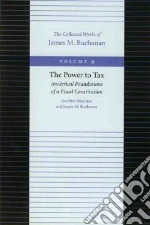 Title :
The Power to Tax
Title :
The Power to TaxAuthor: Brennan Geoffrey, Buchanan James M. Publisher: Liberty Fund Commenting on his collaboration with Geoffrey Brennan on The Power to Tax, James M. Buchanan says that the book is ?demonstrable proof of the value of genuine research collaboration across national-cultural boundaries.” Buchanan goes on to say that ?The Power to Tax is informed by a single idea?the implications of a revenue-maximizing government.” Originally published in 1980, The Power to Tax was a much-needed answer to the tax revolts sweeping across the United States. It was a much-needed answer as well in the academic circles of tax theory, where orthodox public finance models were clearly inadequate to the needs at hand. The public-choice approach to taxation which Buchanan had earlier elaborated stood in direct opposition to public-finance orthodoxy. What Buchanan and Brennan constructed in The Power to Tax was a middle ground between the two. As Brennan writes in the foreword, ?The underlying motivating question was simple: Why not borrow the motivational assumptions standard in public-choice theory and put them together with assumptions about policy-maker discretion taken from public-finance orthodoxy?” The result was a controversial book?and a much misunderstood one as well. Looking back twenty years later, Brennan feels confirmed in the rightness of the theories he and Buchanan espoused, particularly in their unity with the public-choice tradition: ?The insistence on motivational symmetry is a characteristic feature of the public choice approach, and it is in this dimension that The Power to Tax and the orthodox public- finance approach diverge.” James M. Buchanan is an eminent economist who won the Alfred Nobel Memorial Prize in Economic Sciences in 1986 and is considered one of the greatest scholars of liberty in the twentieth century. The entire series will include: Volume 1: The Logical Foundations of Constitutional Liberty € 13,00
|
||
|
1999 |
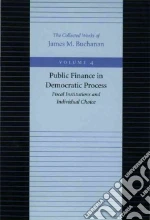 Title :
Public Finance in Democratic Process
Title :
Public Finance in Democratic ProcessAuthor: Buchanan James M. Publisher: Liberty Fund Public Finance in Democratic Process is James M. Buchanan’s monumental work that outlines the dynamics of individual choice as it is displayed in the process of public finance. Buchanan is perhaps nowhere more clearly a disciple of the great Swedish economist Knut Wicksell than he is in the underlying principles of this seminal work. Specifically, he elaborates on these three central Wicksellian themes: 1.Analysis of market failure in the provision of public goods. 2.The insistence on conceiving policy decisions as the outcome of political processes. 3.The necessity of treating the tax and expense sides of the budget as interconnected. Echoing Wicksell’s antipathy to the ?benevolent despot” model of government, Buchanan lays out in this book a starting point for modern public-choice analysis. Recognizing the pathbreaking work he is about to begin, Buchanan opens his preface by stating, ?Fiscal theory is normally discussed in a frame of reference wholly different from that adopted in this book. This dramatic shift of emphasis . . . . requires that I consider the processes through which individual choices are transmitted, combined, and transformed into collective outcomes. Careful research in this area is in its infancy, and the necessary reliance on crude, unsophisticated models underscores the exploratory nature of the work.” According to Geoffrey Brennan in the foreword, ?Public Finance in Democratic Process is a work more hospitable to public finance orthodoxy and could be treated as an extension (albeit an important one) of the conventional approach.” James M. Buchanan is an eminent economist who won the Alfred Nobel Memorial Prize in Economic Sciences in 1986 and is considered one of the greatest scholars of liberty in the twentieth century. The entire series includes: Volume 1: The Logical Foundations of Constitutional Liberty € 13,10
|
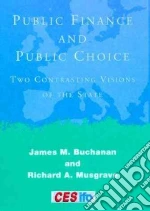 Title :
Public Finance and Public Choice
Title :
Public Finance and Public ChoiceAuthor: Buchanan James M., Musgrave Richard Abel Publisher: Mit Pr In this volume, based on a week-long symposium at the University of Munich's Centerfor Economic Studies, two leading scholars of governmental economics debate their divergentperspectives on the role of government and its fiscal functions.James M. Buchanan, who wasinfluential in developing the research program in public choice, concentrates on the imperfectionsof the political process and stresses the need for rules to restrain governmental interference.Richard A. Musgrave, a founder of modern public finance, points to market failures and inequitiesthat call for corrective public policies. They apply their differing economic and politicalphilosophies to a variety of key issues. Each presentation is followed by a response and generaldiscussion. € 45,50
|
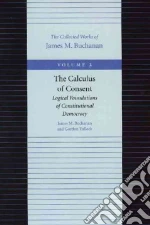 Title :
The Calculus of Consent
Title :
The Calculus of ConsentAuthor: Buchanan James M., Tullock Gordon Publisher: Liberty Fund The Calculus of Consent was co-authored by Buchanan with Gordon Tullock, with whom Buchanan collaborated on many books and academic enterprises throughout their careers. As Robert D. Tollison states in the foreword, ?[this book] is a radical departure from the way democracies conduct their business. The Calculus is already a book for the ages.” This classic work analyzes the political organization of a free society through the lens of the economic organization of society. The authors acknowledge their unease as economists in analyzing the political organization, but they take the risk of forging into unfamiliar territory because they believe the benefits of their perspective will bear much fruit. As the authors state, their objective in this book is ?to analyze the calculus of the rational individual when he is faced with questions of constitutional choice . . . .We examine the [choice] process extensively only with reference to the problem of decision-making rules.” The authors describe their approach as ?economic individualism.” They believe that economists have explored individual choice extensively in the market sector while social scientists have largely ignored the dynamics of individual decision-making in the dynamics of forming group action in the public sector. Written in the early 1960s, The Calculus of Consent has become a bulwark of the public choice movement for which James M. Buchanan is so justly famous. James M. Buchanan is an eminent economist who won the Alfred Nobel Memorial Prize in Economic Sciences in 1986 and is considered one of the greatest scholars of liberty in the twentieth century. The entire series includes: Volume 1: The Logical Foundations of Constitutional Liberty € 13,40
|
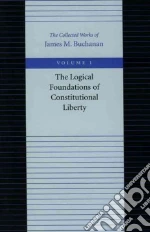 Title :
The Logical Foundations of Constitutional Liberty
Title :
The Logical Foundations of Constitutional LibertyAuthor: Buchanan James M. Publisher: Liberty Fund The thirty-one papers presented in this volume offer scholars and general readers alike a comprehensive introduction to the work of one of the greatest economists of the modern era. Many of Buchanan's most important essays are gathered in this inaugural volume of the twenty-volume series from Liberty Fund of his Collected Works. The essays are arranged thematically and so present a complete perspective on Buchanan’s work. The six sections include: 1. Introduction 2. Politics without Romance 3. Public Finance and Democratic Process 4. The Economist and Economic Order 5. Ethics and Economics 6. The Reason of Rules The editors have focused on papers that Buchanan has written without collaboration and which present Buchanan's earlier, classic statements on crucial subjects rather than his subsequent elaborations which appear in later volumes in the series. Included, too, is Buchanan's Nobel address, "The Constitution of Economic Policy," and the text of the Nobel Committee's press release explaining why Buchanan was awarded the prize for Economics in 1986. The volume also includes Buchanan's autobiographical essay, "Better Than Plowing," in which he gives not only a brief account of his life, but also his own assessment of what is important, distinctive, and enduring in his work. The foreword by the three series editors will be valuable to all readers who wish to engage the challenging but epochal writings of the father of modern public choice theory. The entire series includes: Volume 1: The Logical Foundations of Constitutional Liberty € 13,00
|
||
|
1998 |
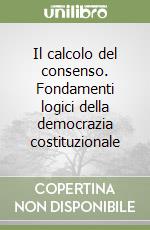 Title :
Il calcolo del consenso. Fondamenti logici della democrazia costituzionale
Title :
Il calcolo del consenso. Fondamenti logici della democrazia costituzionaleAuthor: Buchanan James M.; Tullock Gordon Publisher: Il Mulino Pubblicato per la prima volta nel 1962, questo volume contribuì a porre i fondamenti dello studio dell'organizzazione politica di una società di uomini liberi, ma attraverso una metodologia e un apparato concettuale e analitico derivati essenzialmente dall'economia. Al centro dell'attenzione è il calcolo razionale degli individui di fronte alla scelta delle prime regole della convivenza democratica, ovvero dei suoi fondamenti costituzionali, sulla base dei quali verranno prese tutte le decisioni successive. € 28,41
|
|
|
1997 |
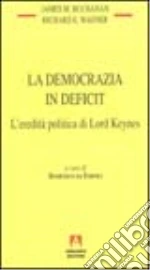 Title :
La democrazia in deficit. L'eredità politica di lord Keynes
Title :
La democrazia in deficit. L'eredità politica di lord KeynesAuthor: Buchanan James M.; Wagner Richard E.; Da Empoli D. (cur.) Publisher: Armando Editore € 18,50
Scontato: € 17,58
|
|
|
1989 |
 Title :
Stato, mercato e libertà
Title :
Stato, mercato e libertàAuthor: Buchanan James M.; Da Empoli D. (cur.) Publisher: Il Mulino € 18,08
|
|